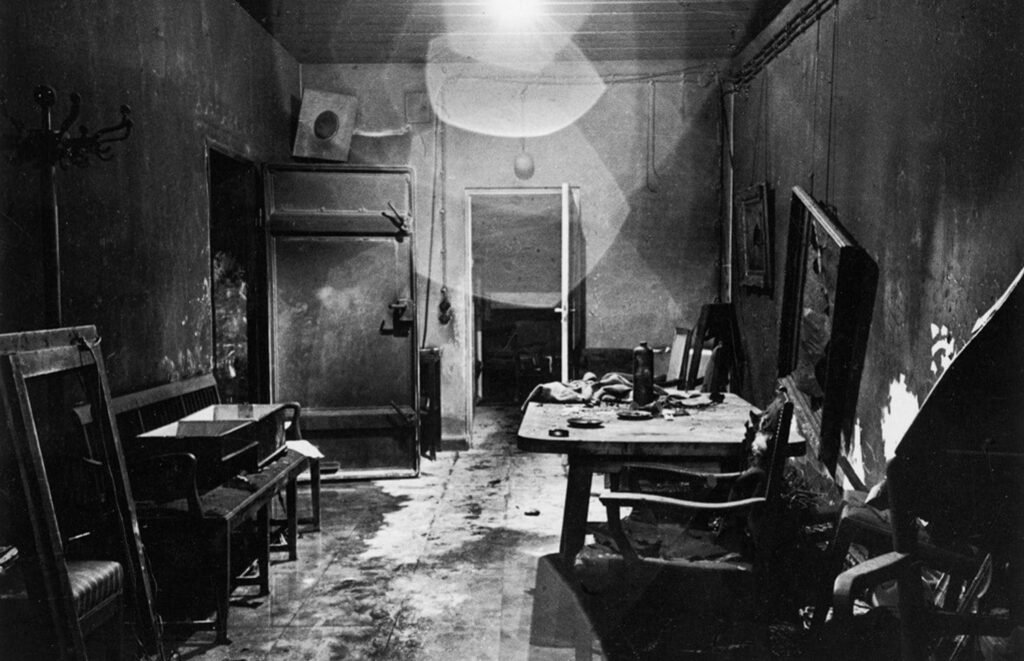The question Was Adolf Hitler a Christian has become a subject of intense debate and examination. Reflecting upon Hitler’s life and the society in which he operated, historians and scholars continue to unravel the intricate narrative of his religious disposition. This analysis seeks to explore whether Hitler’s actions and policies were informed by Christian beliefs or whether they were a part of a far more sinister strategy. Was Adolf Hitler a Christian
Introduction
Adolf Hitler’s stance on religion has been widely discussed and scrutinized, revealing a contentious debate that looms over his historical legacy. While posing as a proponent of Christian values in his public speeches, his regime’s heinous actions and policies tell a different story. This analysis probes into the stark contradictions and manipulations of faith under Hitler’s reign. Was Adolf Hitler a Christian
Historical Context: Was Adolf Hitler a Christian

During his early years, Adolf Hitler was influenced by his Roman Catholic upbringing. However, as he rose to power and established his dictatorship, his public declarations on faith began to carry political implications. Diving into transcripts of speeches, it becomes evident how Hitler would invoke religious language to resonate with the German populace. Was Adolf Hitler a Christian
Despite the apparent religious undertones in his public speeches, there is a substantial body of evidence to suggest that Adolf Hitler‘s apparent allegiance to Christianity was primarily a facade designed to exploit the prevalent Christian sentiment within Germany. Research and analyses by historians such as Richard J. Evans and Ian Kershaw provide a nuanced understanding of Hitler’s strategic use of religious rhetoric. Was Adolf Hitler a Christian
In his comprehensive study, Evans points out that while Hitler’s early speeches were laden with Christian references to gain support, his subsequent actions and private utterances frequently contradicted these public declarations. Kershaw, on the other hand, highlights Hitler’s instrumentalization of Christianity, viewing it as a temporary tool to consolidate power, reflecting a cynical manipulation of faith rather than any genuine belief or conviction. Was Adolf Hitler a Christian
Furthermore, detailed examinations of Nazi policies reveal a systematic attempt to undermine the churches’ influence in Germany. This was evident in actions such as the Kirchenkampf or “Church Struggle,” which sought to bring religious institutions under state control or to marginalize them. Historians argue that these efforts were indicative of a broader strategy to replace Christianity’s ethical framework with the Nazi ideology, further questioning Hitler’s purported Christian beliefs. This complex interplay between public declarations and actual policy makes it clear that Hitler’s relationship with Christianity was at best opportunistic and at worst, deeply adversarial. Was Adolf Hitler a Christian
The Sinister Strategy: Manipulating Faith

Hitler’s approach to religion was utilitarian, aimed at legitimizing his power and promoting nationalist ideology. His advocation for “Positive Christianity” revealed a distorted theology that defied the core tenets of traditional beliefs, seamlessly weaving in anti-Semitic and racial purity narratives. Was Adolf Hitler a Christian
The concept of “Positive Christianity” was central to Hitler’s sinister strategy, allowing him to manipulate faith for his nefarious purposes. This version of Christianity, aggressively promoted by the Nazi regime, sought to reject the Jewish origins of the Christian faith, stripping away its universal message of love and redemption. Scholars like Saul Friedländer have pointed out how “Positive Christianity” served as a tool for the Nazis to infuse Christian teachings with anti-Semitic propaganda, effectively turning religion into an instrument of state policy designed to perpetuate hatred and division. Was Adolf Hitler a Christian
Indeed, historians argue that Hitler’s manipulation of Christian beliefs was an integral part of his broader aim to create a unified German identity that excluded those he deemed unworthy. By co-opting Christianity, Hitler aimed to provide a veneer of moral legitimacy to his racist and destructive policies. Richard Steigmann-Gall’s work dives deeply into this aspect, exploring how Nazi leaders sought to redefine Christianity from within, attempting to align it with their anti-Semitic and nationalist agenda. This redefined Christianity became a state-sanctioned religion that diverged drastically from its theological roots, instead serving the political ambitions of the Third Reich. Was Adolf Hitler a Christian
These manipulations led to deep rifts within the Christian community in Germany. Some church leaders and laypersons resisted, forming groups like the Confessing Church, which sought to oppose Nazi attempts to corrupt Christian doctrine. Yet, others saw alignment with the Nazi’s “Positive Christianity” as a pathway to promoting a nationalist and pure Germany, highlighting the tragic complicity of segments within the church with the regime’s ideology. Was Adolf Hitler a Christian
The tragedy of Hitler’s manipulation of faith lies not only in the horrific outcomes of his policies but also in the deep scars left on Christianity in Germany and beyond. Post-war reflections and analyses have had to grapple with the complex role played by religious institutions and leaders during the Nazi era. Experts like Victoria Barnett have extensively documented the Church’s struggle with its own complicity and the lessons learned from its failure to collectively resist the Nazi regime’s distortions of Christian faith. Was Adolf Hitler a Christian
In conclusion, Adolf Hitler’s relationship with Christianity cannot be understood through a simple binary of belief or disbelief. Instead, it represents a deeply cynical manipulation of religious faith, aimed at furthering a totalitarian and genocidal agenda. Through the lens of history and expert opinion, it becomes evident that Hitler’s use of “Positive Christianity” was not an expression of personal conviction but a calculated strategy to exploit and distort one of the world’s major religions for his destructive ends. Was Adolf Hitler a Christian
Theological Distortion: A Tool for Control

The manipulation of religion was not confined to speeches—it extended to the very institutions that represented Christian faith in Germany. The Nazi regime sought to redefine Christianity by introducing the Reich Church and appropriating Christian symbolism, effectively aligning it with Nazi ideology. Was Adolf Hitler a Christian
The establishment of the Reich Church under the Nazi regime was a blatant attempt to centralize and control Christian worship in Germany, aiming to eliminate any ecclesiastical autonomy that could oppose Nazi doctrine. This move towards a state-controlled church was emblematic of the wider strategy to harness and distort Christianity for political gain. The Reich Church was designed not merely as a religious institution but as an instrument for propagating the National Socialist worldview, stripping traditional Christian worship of its essence and replacing it with a creed that glorified the Aryan race and vilified those deemed as ‘others’, particularly the Jewish people. Was Adolf Hitler a Christian
Historians such as Doris L. Bergen have analyzed this transformation, noting that the Reich Church’s emphasis on racial purity and loyalty to Hitler above all else represented a profound theological distortion. This institution rejected the Bible’s teachings on compassion and inclusivity, instead promoting a gospel of hate that was antithetical to Christianity’s foundational principles. Theologians of the era, like Dietrich Bonhoeffer, vehemently opposed this corruption of Christian doctrine, arguing that the Reich Church had ceased to be a Christian institution at all. Bonhoeffer, as part of the Confessing Church movement, became a symbol of Christian resistance to Nazi attempts to co-opt their religion, ultimately paying with his life for his opposition. Was Adolf Hitler a Christian
Expert opinion underscores the calculated nature of Hitler’s engagement with Christianity. Richard Evans, in his historical analyses, argues that the creation of the Reich Church and the promotion of “Positive Christianity” were not reflective of any genuine religious conviction on Hitler’s part but were strategic moves designed to consolidate power. This perspective is supported by the detailed work of historian Susannah Heschel, who explores how the Aryan Jesus concept promoted by the Reich Church was a clear example of theological distortion serving as a tool for control and persecution. Was Adolf Hitler a Christian
In synthesizing these scholarly perspectives, it becomes clear that Hitler’s relationship with Christianity was marked by manipulation, coercion, and distortion, aimed at destroying the very fabric of Christian ethics to serve the Nazi political agenda. The establishment of the Reich Church and the promotion of a perverted form of Christianity were integral components of this strategy, serving to both control the religious landscape and justify the exclusion and persecution of those who did not fit the Nazi ideal. The consequences of this manipulation reverberate to this day, serving as a somber reminder of the dangers posed when faith is twisted to serve the ends of totalitarian control. Was Adolf Hitler a Christian
The Reaction of the Christian Community

The Christian community’s reaction to Hitler’s manipulation and the Nazi appropriation of their faith was not monolithic. While some religious leaders resisted and condemned the Nazification of Christianity, others were ambivalent, and some even aligned with the regime’s objectives, raising questions about complicity and resistance. Was Adolf Hitler a Christian
The varied responses within the Christian community to the Nazi regime’s manipulations offer a complex picture of struggle, complicity, and courageous resistance. Among those who resisted, the Confessing Church stands out as a prominent example. This group, led by figures like Dietrich Bonhoeffer and Martin Niemöller, represented a bulwark against the Nazification of Christianity, emphasizing the autonomy of the church from state interference and the inviolable core of Christian doctrine against Nazi distortions. Their resistance was not just theological but practical, involving secret seminaries, pastoral care to those deemed ‘undesirable’ by the regime, and even involvement in plots to overthrow Hitler. Was Adolf Hitler a Christian
On the other side of the spectrum, the German Christians (Deutsche Christen) movement illustrates the tragic alignment of parts of the church with Nazi ideology. This group actively supported the Reich Church and its anti-Semitic, racially charged theology, viewing Hitler’s rise as a divine calling to purify both church and nation. Their endorsement of “Positive Christianity” and the Aryan Jesus concept starkly represented the theological corruption that had infiltrated some segments of Christianity in Germany. Was Adolf Hitler a Christian
Expert opinions on this era shed light on the deep internal conflicts within the Christian community. Victoria Barnett, for instance, explores this duality of resistance and complicity in her work, highlighting how the struggles of the time continue to pose ethical and theological challenges for the church today. Similarly, historian Richard Steigmann-Gall’s controversial thesis in “The Holy Reich” suggests that significant parts of the Christian community in Germany saw compatibility rather than conflict between their faith and Nazi ideology, a perspective that has sparked further academic debate on the nature of complicity. Was Adolf Hitler a Christian
In reflecting on these historical dynamics, it becomes apparent that the reaction of the Christian community to Hitler’s manipulations was multifaceted, embodying both the highest forms of moral courage and the depths of betrayal. The legacy of this period forces a reckoning with the dangers of politicizing faith and serves as a cautionary tale for future generations about the pernicious potential of theological distortion for authoritarian purposes. Was Adolf Hitler a Christian
Historical and Theological Analysis
Upon examining the historical record, the prevailing opinion among experts reveals a stark divergence between Christianity’s teachings and Hitler’s actions. The Nazi policies of genocide, warfare, and abject cruelty stand in direct opposition to Christian doctrine, suggesting a severe detachment from genuine religious adherence. Was Adolf Hitler a Christian
This divergence prompts a deeper interrogation into whether Adolf Hitler can be considered a Christian in any traditional or orthodox sense. The consensus among historians and theologians is decisively negative. Hitler’s utilization of Christian motifs and rhetoric appeared tactical, designed to exploit cultural and religious symbols for political gain rather than from a place of genuine faith. Ian Kershaw, a leading historian on Hitler and the Nazi regime, suggests that Hitler’s relationship with Christianity—much like his relationship with many other institutions and groups—was opportunistic, leveraging the widespread Christian identity of the German people to support his own agenda. Was Adolf Hitler a Christian
Furthermore, the concept of “Positive Christianity” propagated under Nazi auspices starkly deviated from core Christian tenets, morphing Jesus into an Aryan figure and rejecting much of the Old Testament to suit anti-Semitic and nationalist propaganda. This deliberate manipulation and reformation of Christian doctrine illustrates a clear departure from any authentic engagement with Christian faith. Additionally, Hitler’s private remarks, as noted by his confidants and as recorded in various memoirs and documents like the infamous “Table Talk”, reveal a deep-seated disdain for Christianity’s foundational principles, particularly its emphasis on compassion and mercy, which he viewed as weaknesses. Was Adolf Hitler a Christian
Expert opinions, such as those from historian Doris Bergen, argue that Hitler’s vision for Christianity—a tool for mobilizing the German people, a means to an end—represents a gross misuse of religion. This perspective is echoed in the work of Robert Erickson, who underscores the strategic nature of Hitler’s approach to Christianity, aiming to co-opt its influence while planning to eventually dismantle its institutions that could not be bent to serve the Nazi state. Was Adolf Hitler a Christian
In sum, the historical record and theological analysis converge on the assessment that Adolf Hitler’s appropriation of Christian imagery and language was a dark misuse of the faith, intended to serve the Nazi regime’s totalitarian goals. His actions and policies, deeply antithetical to Christian ethics, coupled with his strategic manipulation of religious belief for political ends, solidify the assessment that Hitler was not a Christian by any meaningful measure of the term. Through the scrutiny of expert analysis and historical documents, it becomes evident that Hitler’s relationship with Christianity was marked by exploitation and distortion, aiming to subvert a major religion for destructive and tyrannical purposes. Was Adolf Hitler a Christian
Legacy and Lessons
The misuse of Christianity during Hitler’s regime serves as a harrowing reminder of the potential for religion to be exploited for malevolent ends. It underscores the importance of vigilance and ethical scrutiny when religious discourse is entangled with political ambition. Was Adolf Hitler a Christian
The examination of Adolf Hitler’s complex and ultimately manipulative relationship with Christianity continues to be a point of contention among scholars and theologians alike. This discussion not only addresses historical facts but also prompts a broader conversation about the ethics of political and religious power dynamics. Was Adolf Hitler a Christian
According to the research included in Richard Weikart’s book, “Hitler’s Religion: The Twisted Beliefs that Drove the Third Reich,” Hitler’s engagement with Christian concepts was not rooted in genuine belief but was instead driven by a cynical view of religion as a tool for political manipulation. Weikart’s analysis suggests that Hitler viewed Christian and other religious doctrines as malleable ideologies that could be adapted or discarded depending on their utility for his political objectives. Was Adolf Hitler a Christian
Furthermore, Susannah Heschel’s work, “The Aryan Jesus: Christian Theologians and the Bible in Nazi Germany,” explores how the Nazi regime attempted to reframe Jesus Christ as an Aryan hero in opposition to Jewish heritage, illustrating the lengths to which Hitler and his regime would go to co-opt Christianity for their own ends. Heschel’s research underscores that the manipulation of religion was not an isolated endeavor but part of a larger strategy to consolidate power. Was Adolf Hitler a Christian
These expert opinions highlight the inherent dangers when religious symbols and narratives become entangled with political agendas, especially those aimed at exclusion, oppression, and genocide. The legacy of this misuse of Christianity during the Nazi era serves as a critical lesson in the importance of maintaining a clear separation between religious faith and political ideology. It also serves as a cautionary tale about the potential for religious beliefs to be distorted and weaponized, emphasizing the need for constant vigilance and a commitment to ethical integrity within religious communities. Was Adolf Hitler a Christian
In sum, the exploration of Adolf Hitler’s relationship with Christianity, buoyed by scholarly research, reiterates the profound lesson that religion, when entwined with power in unethical ways, can lead to catastrophic outcomes. This historical account urges current and future generations to reflect deeply on the moral responsibilities inherent in religious and political leadership, aiming to prevent the repeat of such dark chapters in human history.
Conclusion
The relationship between Adolf Hitler and Christianity cannot be reduced to a binary of belief or disbelief. Instead, history shows us a narrative rife with complexity, where faith is distorted for political manipulation. This historical analysis reaffirms the distinction between the personal religious beliefs Hitler may have professed and the calculated misuse of religion as a strategic implement of the Nazi regime. The lessons from this chapter in history continue to resonate, warning against the perils of allowing faith to be wielded as a weapon within political discourse.
FAQs
Was Adolf Hitler a Christian?
While Hitler was baptized into the Roman Catholic Church, his religious beliefs and practices were complex. He publicly identified with Christianity at times but also expressed anti-Christian sentiments in private.
Did Hitler actively practice Christianity?
Hitler’s public speeches occasionally referenced Christianity, but his actions often contradicted Christian teachings. His regime targeted Christian institutions, and Hitler’s personal beliefs remain a subject of historical debate.
Did Hitler misuse Christian symbols?
Yes, Hitler exploited Christian symbols for propaganda purposes, attempting to align his ideology with Christianity. However, this was a manipulation rather than a genuine adherence to Christian principles.
Did Hitler support religious freedom?
Hitler’s regime suppressed religious freedom. While some Christians supported the Nazi regime, others, especially those who opposed Nazi ideology, faced persecution.
Did Hitler consider Christianity compatible with his ideology?
Hitler’s worldview included elements contradictory to traditional Christian teachings. He aimed to establish a racially driven ideology, often at odds with core Christian principles.

